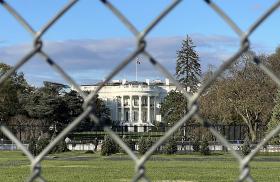
- Policy Analysis
- PolicyWatch 4053
Israel Strikes Iran: Initial Assessments from Washington Institute Experts

A compilation of analyses on the military and nuclear impact of Israel’s initial strikes, Tehran’s response options, the Trump administration’s next steps, public reactions inside Iran, and more.
Last night, Israel launched the opening round of what is likely to be a phased, multiday campaign against Iran, with the tacit—if not active—support of the Trump administration. As the operation and its ripple effects unfold, six Washington Institute fellows offer expert takes on the most urgent policy and security implications for the United States and its partners.
Why Did Israel Attack Now?
Matthew Levitt
Within hours of the attack, the Israel Defense Forces released a statement explaining that they had been asked to proceed with the operation because the past several months’ worth of “accumulated intelligence information” indicated that Iran’s nuclear weapons program was “approaching the point of no return.” More specifically, the regime’s efforts to “produce thousands of kilograms of enriched uranium” and establish “decentralized and fortified enrichment compounds in underground facilities” amounted to an illicit program to enrich uranium to weapons-grade levels. Iran could achieve this goal, the IDF concluded, within “a short period of time.”
In addition, the report noted “concrete progress” in Tehran’s “efforts to produce weapons components adapted for a nuclear attack.” The regime had been making such weaponization progress for some time, but “more so” since the beginning of the Gaza war. Notably, this assessment differs sharply from the conclusion offered in a March report from the U.S. director of national intelligence, namely, that Iran “is not building a nuclear weapon.” According to the IDF, newly revealed intelligence showed that even while negotiating with the United States, Iran has been “advancing a secret plan” to fast-track technological advancement across all elements of its nuclear program, with senior scientists “working to secretly develop all components for developing a nuclear weapon.”
In the post-October 7 world, Israeli authorities are no longer willing to hope for the best while enemies sworn to their destruction accumulate the weapons necessary to achieve that goal. Hence, they concluded that “the State of Israel has been left with no choice” but to defend its citizens.
This posture was made possible through previous operations on multiple fronts. Over the past year, Israeli forces have effectively defanged Hezbollah, eliminated the threat of massive rocket barrages from Lebanon, crippled much of Iran’s air defense system, and disrupted its production of ballistic missiles.
How Does the Strike Affect U.S. Deterrence Calculations?
Michael Eisenstadt
The goals of Israel’s operation seem clear: to decapitate the senior leadership of Iran’s armed forces and nuclear program; suppress its air defenses to clear the way for subsequent attacks; attack its surface-to-surface missile complex to hinder an effective response; and, most important, destroy its nuclear program. Today’s follow-on strikes have apparently targeted officers appointed to succeed those killed last night, indicating that Israel seeks to prevent Iran’s military leadership from recovering after the shock induced by the initial strikes.
These events should be seen as the culmination of a thirty-year covert Israeli campaign to disrupt and delay Iran’s nuclear program. They also represent the opening salvo of a new phase that will seek synergies between covert and intermittent overt military action, with the overall goal of disrupting efforts to reconstitute the program in the months (perhaps years) to come.
Thus far, Iran’s only known military response has been a counterstrike involving 100 suicide drones. It remains to be seen whether continued military pressure will prevent it from mustering a broader, more effective response against Israel, and whether it will attack U.S. interests in the region and risk broadening the conflict.
Looking forward, two questions loom large. Can these strikes set the stage for renewed nuclear diplomacy with Iran under more favorable terms? And if Tehran rebuffs offers of renewed diplomacy, will Israel (perhaps with U.S. encouragement) transition to attacks on the regime’s leadership and the country’s economic infrastructure, to facilitate action by the Iranian people to overthrow the Islamic Republic?
Is Nuclear Diplomacy Stalled?
Patrick Clawson
In the wake of Israel’s attack, Iran has announced the indefinite suspension of indirect talks with the United States, the sixth round of which was set to take place in Oman on June 15. Much as Tehran wants an agreement, it would be hard-pressed to explain to audiences at home or abroad why it would continue the negotiations. Even the main proponent of nuclear talks, Foreign Minister Abbas Araghchi, has blamed the United States for the attacks.
While statements from many governments—including some sympathetic to Iran, such as China—have called for talks to de-escalate the situation, the most optimistic scenario is for negotiations to resume further down the road, after a cooling-off period. And if Iran strikes U.S. assets or takes other intemperate actions—a plausible scenario—then the talks would likely shut down completely.
Iran has previously threatened to leave the Nuclear Nonproliferation Treaty if attacked. While it may not go that far, it could decide to reduce its cooperation with International Atomic Energy Agency inspections, as it has done after past Israeli operations. Meanwhile, Israeli strikes make it politically implausible that European governments will follow through on their repeated pledge—namely, that if no nuclear deal is achieved, they would reimpose UN sanctions on Iran before the “snapback” authority granted under Security Council Resolution 2231 expires in October.
In Washington, President Trump has publicly exclaimed that “Iran must make a deal, before there is nothing left.” Notably, he told Tehran that today is “Day 61,” referring to his sixty-day ultimatum.
What Should the United States Do?
Dana Stroul
In the coming days and weeks, Washington will need to calibrate its support for Israel’s actions with two other crucial objectives: (1) preventing an escalatory cycle that could result in attacks against Arab partners or U.S. forces in the region, or a broader Iran-Israel conflict, and (2) preserving the main U.S. goal of ensuring that Iran does not have a path to a nuclear weapon. For at least the past five presidential administrations, U.S. policy has prioritized diplomacy to address Iran’s nuclear ambitions while retaining military options should diplomacy fail. After the sixty-day deadline that President Trump imposed in April to test Iran’s willingness to roll back its program, the talks slowed to a crawl over Tehran’s insistence on retaining uranium enrichment capabilities. Although Israel’s strikes will set the program back significantly, they are unlikely to quench the regime’s nuclear ambitions or eliminate all of its relevant technical capabilities.
Going forward, perhaps the most important indicators of U.S. support for Israel’s military campaign would include the following: public statements reinforcing the necessity of the strikes; commitments to continue providing military equipment, logistical assistance, and other support for the operation; and an active role in defending Israel against anticipated Iranian retaliation. So far, President Trump has taken initial steps on all of those fronts: he has publicly expressed support for the campaign, affirmed that more U.S. military equipment will be transferred, and allowed American forces to actively cooperate in downing Iran’s initial retaliatory salvo of 100 attack drones in Jordanian airspace. He has stopped short of ordering U.S. offensive action against Iran, either unilaterally or in cooperation with Israel.
Meanwhile, Secretary of State Marco Rubio warned Iran last night not to attack U.S. interests or personnel. To drive this point home, however, he will need to make clear that the United States will respond militarily if such attacks occur.
Washington should also clarify its commitment to help defend Arab partners in the Middle East. This is especially important given their lingering concerns about Iran’s 2019 attack on Saudi oil facilities—an incident that the first Trump administration did not take meaningful action on.
Arguably, the most expedient way to prevent an Iran-Israel escalatory cycle is to decisively declare America’s intent to support Israel. This would force what remains of Iran’s leadership to decide whether they will test Washington’s resolve and risk U.S. forces entering the fray.
How Is the Iranian Public Reacting?
Holly Dagres
Israel’s overnight strikes have left many Iranians shaken and angry. Much of that anger is being directed at their leaders—for instance, some Iranians are questioning why there were no air raid sirens or shelters to take cover, with at least one highlighting the years of state resources that were instead spent waging a war on women.
The clerical establishment now finds itself on the defensive, and not just because it failed to protect civilians and the Islamic Republic’s top brass from Israel’s attacks. It must also answer for the broader consequences of policies that have isolated the country from the wider global community that many Iranians want to partake in. Indeed, the strikes have intensified already simmering tensions, and many Iranians want to see the Islamic Republic gone. Crucially, however, most of them do not want this outcome to come at the cost of bloodshed and war.
Such sentiments expose a broader dilemma for the establishment. Regardless of whether Tehran launches a heavy-handed retaliation or not, it risks domestic unrest, especially if Israel continues its reported days-long operation. Authorities have already restricted internet usage and threatened legal action against celebratory social media users, suggesting a preemptive crackdown.
However, a perceived failure to stand up to Israel could undermine the establishment’s core narrative of “resistance” among the minority of supporters it has left. The coming days will reveal whether Tehran prioritizes revolutionary zeal or internal stability. Either path carries significant risks for the system’s survival.
How Are Arab States Responding?
David Schenker
Several Arab states reportedly participated in the downing of drones that Iran fired at Israel in retaliation for last night’s attack, or shared radar information to help defeat those threats. Yet their official public responses to Israel’s actions have been uniformly negative. Many Arab governments released statements reflecting their longstanding concern that escalation with Iran would result in regional destabilization, disruption of shipping lanes, and negative economic effects. In general, they had hoped that the nuclear issue could be solved through negotiations, and most of them are now urging de-escalation.
During President Trump’s May visit to the region, Gulf leaders reportedly told him that they opposed an Israeli strike on Iran. Although he heeded their advice on other key matters—such as suspending sanctions on Syria—he eventually sided with Israel regarding the need for action against Iran.
Despite the negative tone of the latest government statements, it is important to note that they were issued by foreign ministries rather than Arab leaders themselves, and that they expressed little if any sympathy for Iran. These factors suggest that the declarations were largely performative, possibly intended to insulate these states from Iranian retribution.
Specific reactions so far have included the following:
- Saudi Arabia, the United Arab Emirates, and Qatar all condemned Israel’s attack, due in part to concerns that Iran’s retaliation could involve strikes on them as well.
- Jordan publicly distanced itself from Israel’s operation, though its air force was quick to down Iranian drones attempting to fly over the kingdom. Amman essentially reiterated the position it took during Iran’s April 2024 strikes against Israel—that it would not allow its airspace to be used by any other states.
- Egypt criticized Israel’s operation, describing it as an “unjustified” and dangerous escalation.
- Algeria likewise denounced Israel’s “blatant aggression”— unsurprising given its close ties to Tehran.
- Oman, which had been mediating the U.S.-Iran negotiations, also lamented the strikes, suggesting they were timed to scuttle the talks.
For media inquiries, contact: Jeff Rubin, press@washingtoninstitute.org, 202-230-9550








